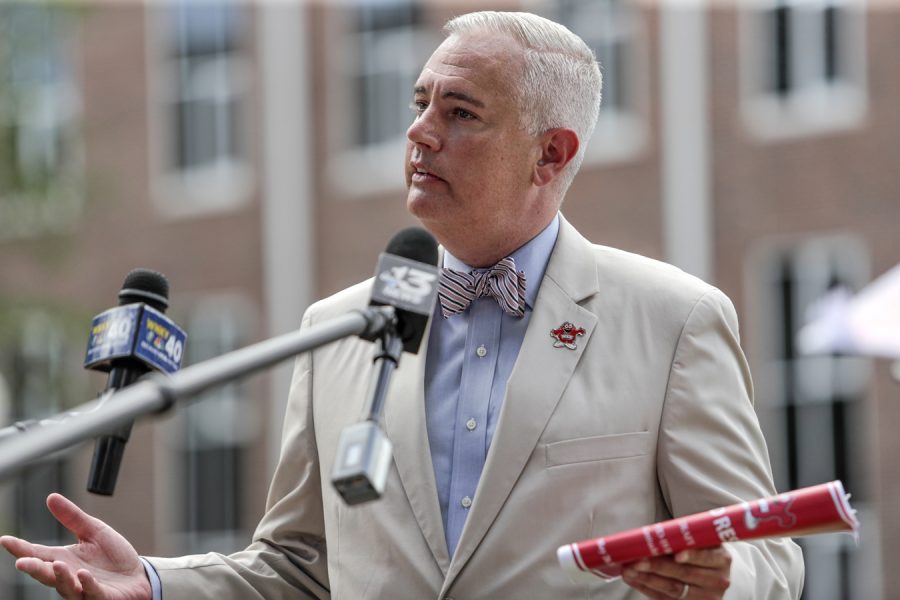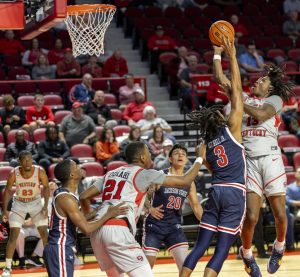The man in the seat: Five years of President Caboni
This story originally appeared in the Herald’s printed news magazine edition on Tuesday, Sept. 6.
September 9, 2022
A lot can happen in five years. Timothy Caboni’s first five years as president on the Hill proves this to be true.
To name just a few events, Caboni’s administration was tasked with patching up a massive budget shortfall, navigating a worldwide pandemic and dealing with the fallout of a tornado passing directly next to campus.
WKU itself underwent large-scale physical change during Caboni’s first five years. Barnes Campbell and Bemis Lawrence halls were demolished and the First Year Village now stands in their place. Garrett Conference Center and Tate Page Hall were torn down for future developments and the Commons at Helm Library was officially opened in the spring.
It seemed appropriate to take a look back on the president’s tenure, from 2017 to now, to see how the job has changed Caboni, give younger Hilltoppers a look into their university’s past and to provide a breakdown of the administration up to this point.
GROWING PAINS
Caboni and his wife, Kacy, came to Bowling Green from the University of Kansas, where he had served as the vice chancellor for public affairs.
His office at Kansas was right next to that of former chancellor Bernadette Gray-Little, who offered Caboni glimpses of what running a university entailed.
“She would open up the ‘black box’ and let me peer inside and see what really happened,” Caboni said. “And even though she helped me look inside, unless you’re the person in the seat, you don’t really understand it.”
Caboni enjoyed the public affairs work, but his position was disconnected from students. The presidency at WKU put him in closer contact with the student body.
“That was the amazing thing about re-entering [WKU] five years ago, coming back to a university where I was in 1994 when I graduated – it was the same depth of caring, of support and relationships that existed then,” Caboni said. “It’s one of the things I love about being here. It takes forever to walk from [the president’s office], down to DSU, to eat lunch at Fresh, because people stop you along the way. And they stop you along the way to get back to the office.”
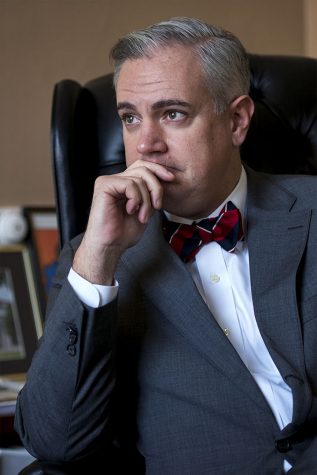
Despite returning to familiar ground in the place he earned his master’s, the first year on the job wasn’t easy.
“In the first year, Kacy and I would joke that it felt like Groundhog Day sometimes. That I would shut my eyes and then do it again, like, ‘did I sleep?’ It didn’t feel like it,” Caboni said.
One of the things the administration first took on was a $40.8 million budget shortfall, which resulted in a set of layoffs.
“When you walk into the budget challenge that we had in the inaugural year I was here, the first year I was involved – just heart wrenching decisions, the worst decisions of my professional career and life, that essentially were mine,” Caboni said. “That affected the lives and the livelihood of 182 people. Those were awful, sleepless nights. There were times when it felt like I hadn’t slept in a week. But at the same time, that’s your responsibility.”
As president, no matter how much advice or input one receives, “At the end of the day, it’s your decision,” Caboni said. “It’s my decision. But also, I’m the one who has to answer for it, even if it was somebody else’s recommendation.”
The job creates pressure, weight and stress, but for Caboni, “It’s what’s fun, too. I prepared for, essentially a lifetime, but professionally for over 20 years to be able to do this job. And you want those decisions, right?”
Caboni said some of the most important learning he’s had in the position was in how he managed those who reported directly to him. A self described “hands-off manager,” he now knows he has an obligation to step in if a catastrophe is on the way.
“If someone is making a mistake, and I’m as certain as I can be that they’re making the wrong call, and it’s going to be a big decision – instead of allowing them to make that decision, if they’re driving toward a cliff, I need to grab the wheel and yank it,” Caboni said.
Kirk Atkinson, a professor in the Gordon Ford College of Business and former chair of WKU’s faculty senate, confirmed this kind of management approach.
“He does not like to micromanage, he likes to delegate. That sort of comes with advantages and pitfalls,” Atkinson said.
Atkinson recalled that he gave Caboni similar advice about taking the wheel in times of crisis during the resignation of former Provost Terry Ballman.
Ballman was appointed by Caboni in 2018. In the spring of 2019, a faculty senate meeting was called following the sudden resignation of Larry Snyder, former dean of the Potter College of Arts and Letters.
Snyder had been forced out by Ballman, prompting campus-wide outrage. The faculty senate approved a no-confidence resolution in Ballman by a 50-10 vote, and she resigned from her post.
“When I was senate chair, and we had the issue with Provost Ballman – [those were] almost my exact words to him,” Atkinson said. “Sometimes you can delegate. But sometimes you also need to be able to steer the ship a little bit, and give advice to those people you’re delegating to…it’s one of those things, especially when you have a relatively new group and your leadership team – sometimes you just have to do that.”
ALL THAT GLITTERS…
Five years of the presidency has taken a physical toll on Caboni.
“If you look at photographs, I literally look 10 years older than I did five years ago,” Caboni said. “Now, in some ways, that’s okay. I was accustomed to being the youngest looking person most of my career – unfortunately, I think that is now over. I’m pretty much a white-haired old guy now.”
As president, Caboni said he has had to make major sacrifices in two main areas.
“You make sacrifices, particularly at the outset, that are around your time and decisions about how you allocate your time,” Caboni said. “My diet was probably not the healthiest in the first couple of years – I’m from New Orleans, so I love food.”
Because of the time commitment required for the job, it became harder to fit exercise into his schedule.
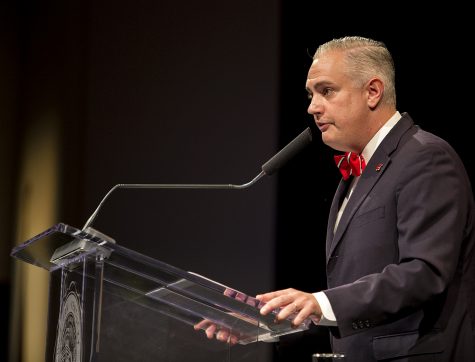
“You don’t exercise as much as you should. You don’t eat as well as you should. But there comes a point where you need to also be an example for the community,” Caboni said. “In the past couple of years, the pandemic created opportunities for more healthy behaviors I think, so I think my diet has gotten better, my exercise has gotten better.”
Caboni said he’s “not very good” at keeping a work-life balance, but he does have a pair of activities he uses to separate work from home.
“I’ve got a bicycle trainer, and I’ve tried to work out on that as many times a week as I can,” Caboni said. “I’ll try and do that, that’s good for me physically, but it’s also good for me mentally because you just let everything go and focus on Spotify or whatever’s going on in your ear, working out and sweating it out.”
He keeps his connection to his hometown alive by cooking up cajun staples when he has the time.
“I love to cook. For better or for worse, I love to cook. I love to cook food from home,” Caboni said. “If you ever meet somebody from New Orleans, the thing they will tell you they’re always homesick for is food… I will cook crawfish etouffee, or gumbo, or whatever else it is I feel like cooking and that, for me, is relaxation.”
Caboni said it’s a good thing that his cooking is coupled with exercise.
“I’m hoping they cancel each other out,” he said.
Caboni said at some point, you adapt to the stress, “take better care of yourself, which I think I do now, and you have experience on which you can rely that you didn’t have when you started.”
The position isn’t always glitz and glamor. Caboni offered a warning for those who point their careers toward a university presidency.
“If you’re doing it because you think it’s glamorous, that’s the wrong reason to do the job,” Caboni said. “I think that younger folks, or people who are not near the position or [who] don’t have familiarity, sometimes see it that way. It’s not all public speeches and dinners and rubbing elbows with whomever you rub elbows with, or having nice seats at theater events and concerts.”
Caboni said that if those things are considered work, “it’s wonderful work, seeing what our students create and being able to celebrate them,” but oftentimes those privileges can only be enjoyed after “a long day of meetings.”
“When you haven’t slept very much, and you have to drive or fly somewhere, and you’re staying at an airport motel in advance of a day’s worth of work, and you’re just exhausted, but you have 12 more hours to go and you have to be positive, excited, ‘on’, engaging – it physically can hurt,” Caboni said.
DEFINING MOMENTS
Before his time at Kansas, Caboni served as a professor and later an associate dean at Vanderbilt University.
He said while he loved the work, “at the same time, many of those students had grown up with a level of privilege that I couldn’t even comprehend.”
At WKU, Caboni asked himself: “How can I help young people who otherwise might have not had a chance to [attend college]? How can I help them? How can we help them have that opportunity?”
In September 2020, Caboni announced the start of the Hilltopper Guarantee, which covers 100% of tuition for Kentucky freshmen receiving Pell Grant assistance with at least a 3.0 grade point average.
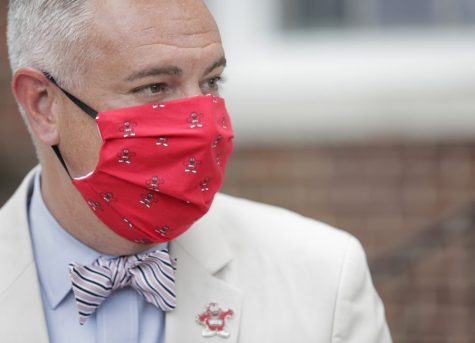
Guy Jordan, associate professor of art history at WKU, said the Hilltopper Guarantee is “not just something that I think should be on the list of [Caboni’s] accomplishments, but I think that should be at the top of the list… that’s the most significant, good thing that’s happened on this campus since I started working here 15 years ago.”
Jordan said the Hilltopper Guarantee is at the core of what WKU is as an institution and it “makes me proud to teach here.”
Todd Stewart, WKU’s athletic director, said Caboni’s leadership during the COVID-19 pandemic stuck out as a defining moment of his presidency.
“There was no blueprint for anyone to follow with the onset of COVID-19 in the spring of 2020. We all had to adapt and adjust to the changing dynamics and landscape, and there were countless unknowns and uncertainties,” Stewart said via email. “When strong leadership was needed more than ever, Caboni rose to the occasion by confidently inspiring others that we could move forward. His steady guidance throughout COVID-19 set the tone for our university to safely and successfully manage through that unprecedented time.”
Caboni said he looked back at how institutions handled the 1918 influenza pandemic when searching for guidance in 2020.
“That was helpful at how we navigated, but also just gave me some solace that you can get through this, it’s possible,” Caboni said. “Even though there were days when we just didn’t know what was going to happen.”
SHOULDER TO LEAN ON
As president, Caboni looks for guidance from outside the university.
“You’ll notice I’m using folks outside of the institution – that’s for a very specific reason,” Caboni said. “Because that creates real objectivity. Most of them have no connection to Bowling Green or WKU. They have long experience in higher education [but] they’re not politically connected to the place. “
Going back to his roots, Caboni seeks advice from figures he met during his time at the University of Kansas.
“I’ve stayed in contact with the current chancellor at Kansas, Doug Girod,” Caboni said. “He and I have shared things, particularly pre-pandemic, along the way.”
Girod said he has been able to speak with Caboni about all facets of higher education.
“Higher education is a close-knit community of practitioners who constantly exchange ideas — and that’s true of me and President Caboni,” Girod said via email. “[…] in addition to he and I chatting when we can, I know members of my office and members of President Caboni’s team stay in touch and trade ideas.”
Caboni also stays in touch with Eli Capilouto, president of the University of Kentucky.
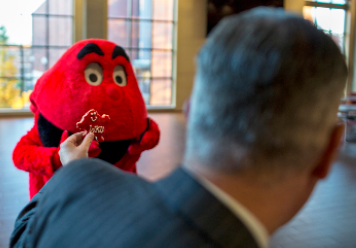
“Eli has said that if we were in grade school together, we likely would have been separated very quickly,” Caboni said. “We’ve visited several times, and the conversations have been ones that you can only have between university presidents.”
Caboni said it’s “good to have a strong relationship” between the presidents of WKU and UK.
Caboni has also had the chance to provide guidance of his own, namely to David Cook, the newest president of North Dakota State University.
“One of the things that [Caboni] kind of taught me was, you don’t really know what you’re getting into until you’re in it,” Cook said. “You better be in it 110% because it’s a lot. It’s an all day, every day kind of job. You better believe in it and believe in what you’re doing.”
Cook said Caboni is someone he will go to for help as he navigates the first year of his term.
“I might have a question or two I want to ask him, so you can say I’m still looking to him to get some advice,” Cook said. “He will be a phone call I will make some time very soon about a few things.”
MISCONCEPTIONS
When asked what he wished more people understood about the position of university president, Caboni immediately shared that he doesn’t read social media.
“I think our world in many ways has become toxic,” Caboni said. “Social media enables that toxicity to enter into our conversations. As an institution I hope we model civility, even in disagreement. And I try my best to be able to do that.”
Caboni said the effects of social media are something he notices negatively impacts other people – so he chooses to avoid it.
“They can say whatever they want to say about me, but people who are close to me, Kacy, folks who work with me every day and actually know who I am, I think it’s painful for them,” Caboni said.
Comments about decisions can be hurtful, but at the same time, Caboni understands it comes with the territory.
“It is hurtful to me, some of what has been said, about decisions that people disagree with. Okay, you can disagree with me, but to demonize me as a person? That’s painful,” Caboni said. “[At the] same time, it goes with the job, right? And it’s the world we live in.”
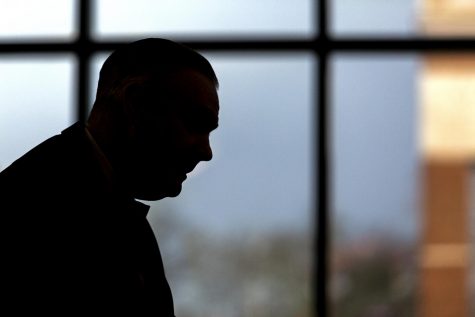
Caboni also tries to maintain a positive outlook, sometimes annoying Kacy in the process.
“I also say this: suck it up, and do the job. And at the end of the day, that’s the focus, right? I wake up in the morning literally singing songs, you can ask Kacy. It annoys the living daylights out of her,” Caboni said. “…I wake up excited about the prospect of coming to work and changing the trajectory of young people’s lives.”
Caboni said everything else is noise and a distraction.
“If you allow that to change you, to change the decision, or to distract you from the job, then you will not be successful,” Caboni said. “And so I don’t.”
Caboni also said there is no one person behind the university’s decisions.
“I think the other other thing that I wish people knew is that we make decisions intentionally with data, and there are lots of folks involved,” Caboni said. “There is no ‘person behind the curtain’ who’s pulling levers. This is truly a team effort.”
ADMINISTRATIVE CHANGES
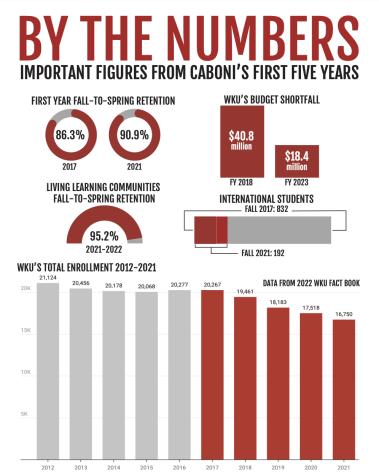
During Caboni’s time at WKU, he has built a leadership team he feels is student oriented.
“Over five years is a transformation of the university’s leadership team,” Caboni said. “There are many people, if not most of the people on the cabinet and who are academic leaders on this campus, who are new. And that’s for a really particular reason: they have to buy into students being at the center of everything we do.”
Cook said one of the lessons Caboni imparted to him was to assemble a strong team at the outset of his presidency.
“You’re kind of going into battle or war, you’ve got to have the right team leading and helping you and smart, talented leaders surround themselves with really good people,” Cook said. “I know that’s one of the things he said very clearly upfront… you’ve got to make some tough decisions early. You’ve got to want to have your team helping lead the way.”
Caboni said being president is not about himself, but about what is best for the students.
“I love students, and anybody who knows me knows that. At the end of the day, that’s why we’re here,” Caboni said. “Just keep focusing on that and not the other nonsense.”
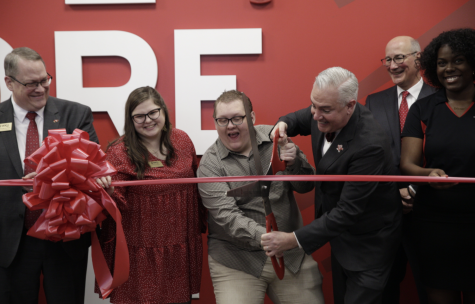
Several faculty members chimed in on Caboni’s student oriented leadership.
Susan Howarth, executive vice president for strategy, operations and finance, said she believed students were Caboni’s biggest motivation.
“Without a doubt – and I’ve worked for a number of presidents over my career, been in higher education for 33 years – [he] is student centric,” Haworth said. “It’s not about President Caboni, it’s about you guys [the students].
And what he and we do to help mold a person and a student into being successful. And that’s what motivates him day-in and day-out.”
The university’s strategic plan sits on Caboni’s coffee table in his office because it “drives everything that we do, and it sits there because it’s a reminder to me every day that that’s what matters,” Caboni said.
Tania Basta, dean of the College of Health and Human Services, said she applied for her position because of the strategic plan and its “vision for WKU.”
“I am a community-engaged researcher, so I wanted to be at an institution that valued community engagement as a priority,” Basta said via email. “Since it was explicitly mentioned in the strategic plan, I felt that it was truly important to President Caboni and the university community.”
Ethan Logan, vice president of enrollment and student experience, said Caboni was one of the reasons he came to WKU.
“I was intrigued by his position, his vision for [where] the institution, under his leadership, was going to be going,” Logan said. “And the second thing about it is that he has a strong background in higher education… I’ve been very, very excited and pleased to be a part of his administration because I think that he has a very solid grasp of the institution and higher education in America today.”
Phillip Bale, chair of the Board of Regents, said one of Caboni’s significant accomplishments has been putting people into his administration who align with the university’s strategic plan.
“One of the most important things is that he’s been able to assemble his own administrative cabinet, deans and provost that now share his vision and commitment to our strategic plan,” Bale said. “So I think that’s been very important for the successes that we’re going to see in the future.”
Molly Kerby, assistant provost for institutional effectiveness, shared that Caboni has had the most challenging presidency she has seen during her time at WKU.
“He gets out in the community. He runs up and down the hill. He shakes hands with students and he’s just extremely energetic,” Kerby said. “And he’s determined. There’s another way to look at it too. Because I mean, with all these things that came at him – he just kept on sliding through.”
When asked if there was anything Kerby thought she would have handled differently if she was in Caboni’s position, she replied, “I do that every day with every position.”
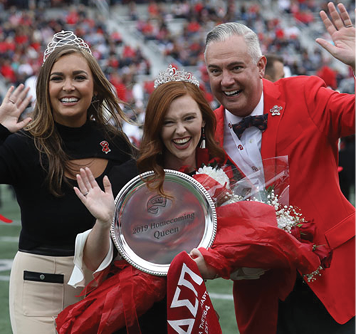
She also said Caboni has been extremely supportive of diversity, equity and inclusion and that prior to his presidency, there was no DEI budget.
Martha Sales, dean of students, said she felt Caboni’s presidency brought more student-centered programming to the university.
“President Caboni is very student centered,” Sales said.”That means a lot to me as the dean of students.”
Sales is also involved with the Intercultural Student Engagement Center, which she said Caboni has helped improve during his term.
“He’s assisted the university with our underrepresented minority recruitment, retention and graduation,” Sales said. “Those things have been defining for me and for individuals in the community.”
LEGACY
Caboni said he hasn’t given thought to how his time at WKU will ultimately be remembered.
“If you start thinking about legacy, you’re dead in the water,” Caboni said. “I’m worried about every day, how do we take care of our students. If it starts being about you, then it’s time to stop.”
For the next leg of his presidency, Caboni has one simple hope.
“Let’s hope the second five years are not as tumultuous as the first five.”
Co-Editor-in-Chief Debra Murray can be reached at [email protected]. Follow her on Twitter @debramurrayy.
Co-Editor-in-Chief Jake Moore can be reached at [email protected]. Follow him on Twitter @Charles_JMoore.

